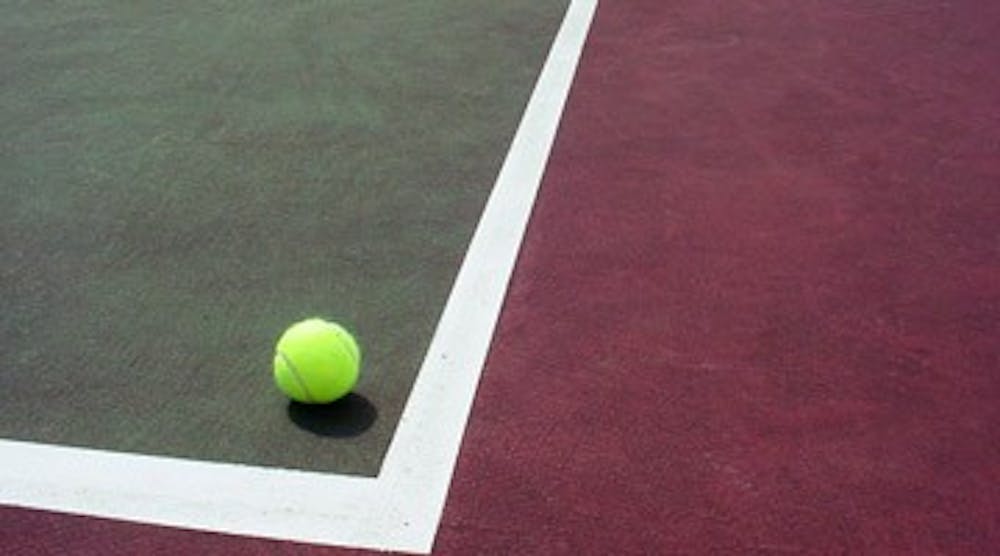Bad calls are an unfortunate but ubiquitous aspect of most athletic competitions.
But in some college sports - such as tennis and squash - opponents traditionally officiate each other, making bad calls even harder to swallow.
Brandon O'Gara, a senior co-captain of the Penn men's tennis team, estimates that cheating occurs about a couple of times each match.
"Some people are just going to do that," O'Gara said. "They'll try to sneak a bad call in here or there to get a free point."
In order to try to curb cheating, several roving umpires are present at each match. Umpires have the authority to call foot faults and award point penalties for unsportsmanlike play.
But other calls, such as line calls, double bounces and net interference are still up to the players themselves. In the case of an egregiously bad call, however, a player can appeal if an umpire is watching.
Some larger conferences such as the Pac-10 have an umpire assigned to every court, but most Ivy League matches have fewer umpires than courts.
"It's up to each program how many officials they're going to have," said Penn coach Nik DeVore.
Although DeVore said that "in a perfect world" there would always be umpires on every court, he said that it is partially "a budgetary issue," since hiring extra officials could be a prohibitive cost. DeVore added that umpires are far from a panacea because a single umpire cannot be in the correct position to make accurate calls everywhere on the court.
"Umpires don't even catch the call all the time anyway, so it's not like having an umpire there is definitely going to prevent you from making a bad call," O'Gara said. "It's going to happen regardless of whether there's an umpire there or not."
DeVore and O'Gara both said that some players and teams earn reputations for cheating on their calls.
"Usually [cheating] starts at the top," DeVore said. "If the coaches can hold their players accountable for cheating . then typically that team is not going to have players that do that."
About 10 years ago, the Intercollegiate Tennis Association eliminated let serves in men's tennis in response to repeated instances of erroneous let calls on ace serves. Although DeVore said that "a lot of coaches don't like that rule," junior Justin Fox said that he likes it because it helps maintain the flow of the match.
Even with these rules in place, O'Gara said that controversies are so common that "it's hard to give a specific example" of one. Still, O'Gara said that an incorrect call has likely affected the outcome of at least one of his matches.
"It sucks, but that's just part of the game," he said. "It's something you're going to have to deal with."
Although the lack of officiating still causes problems, in tennis the rules are mostly cut-and-dry, unlike in squash.
Squash has line calls just like in tennis, but because players occupy the same enclosed area, there are other rules - such as those governing obstruction - that are largely subjective.
For example, if a player's positioning denies the opponent a chance at a clear swing, a referee can award either a let or, if the obstruction is deemed intentional, a stroke penalty.
Men's squash coach Craig Thorpe-Clark said that some players may try to intentionally maneuver themselves in order to influence the referees on an obstruction call or intimidate their opponents.
"That is a part of the game. I can't say it's a good part of the game," Thorpe-Clark said.
In all squash matches except the individual championships, players from both teams share the responsibility of refereeing. A player on the away team referees odd-seeded matches, and a player on the home team referees even matches. With so much room for interpretation of the rules, that setup may seem like a recipe for disaster.
"I think we've had moments where we wished that teams would show less bias," women's squash coach Jack Wyant said. "But I'd have to say that on the whole . it's been only the rarest exception where we've had an issue with the refereeing."
Chuck Yrigoyen, associate director of the Ivy League, said that self-officiating in some sports "is a historical thing" and that the Ivy League does not govern officiating in squash because it is not an official NCAA sport.
Thorpe-Clark said that it might be impossible to have outside referees for every match even if cost were not an issue.
"There's not a big infrastructure of readily available referees," he said. "There might be 10 qualified referees in the Philadelphia area, but who knows how many of them would be willing to give up their Sunday afternoon."
Thorpe-Clark added that squash players have the skills and knowledge to referee because they are used to refereeing in junior squash matches starting at an early age.
But in college, "they're now playing on a team," Thorpe-Clark said.
"That certainly adds pressure to the refereeing and may occasionally lead to even favoritism being made."
Although refereeing issues do occur, the coaches agree that most players show good sportsmanship and the system is largely fine the way it is.
But because sports like tennis and squash have traditions as gentlemen's sports, the lack of officiating isn't likely to change any time soon.
"I've been doing [officiating in the Ivy office] for several years," Yrigoyen said. "This issue of self-officiating in those sports really has not come up. It's not something that's real high on everybody's radar."



